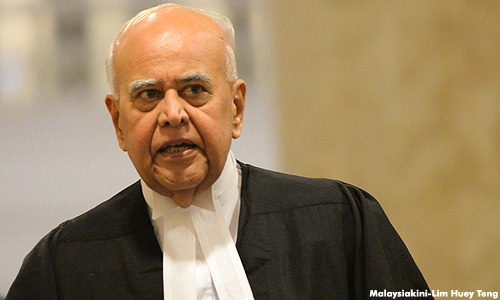
The Federal Court's judgment in a case brought against Transmile Group Bhd's CEO Gan Boon Aun in March had far reaching implications on the rights of an individual, said lawyer Gopal Sri Ram.
Gopal, a former Federal Court judge who is now representing Gan, said the judgment meant that if a law was passed and it affected one's life and personal liberty under Article 5 of the Federal Constitution, the government or prosecution can now argue that this violation of rights was done in the interest of the community and therefore the law was good, even if its illegal.
"If the police throw you in prison, and the procedure followed is unfair, it is alright because it is in the interests of the masses," he told reporters today.
He was speaking after the Federal Court dismissed Gan's review application against the earlier judgment on March 16.
The Federal Court did so on grounds that the review application did not meet the threshold under Rule 137 of the Rules of the Federal Court.
"The applicant has not overcome the threshold on breach of natural justice," said Chief Judge of Sabah and Sarawak Justice Richard Malanjum, who led the five-member bench today.
Other members of the panel are Federal Court judges Justices Ramly Ali, Balia Yusof Wahi, and Prasad Sandosham Abraham and Court of Appeal judge Alizatul Khair Othman.
The panel urged Gopal to find a suitable case which can be used in the attempt to challenge the earlier March 16 decision.
'No second bite at the cherry'
Earlier, Gopal had told the court that the judgment was a breach of the principle of natural justice especially on the rights on Article 5 regarding liberty of a person, as it did not take into account on the doctrine of proportionality.
He said this is important and if the review is not allowed it would impact other statutes.
He argued that the proportionality issue was never raised by the earlier bench that was led by then Chief Justice Arifin Zakaria, and hence Gan was seeking a review.
The principle of proportionality envisages that a public authority ought to maintain a sense of proportion between his particular goals and the means employed to achieve those goals so that the action impinges on the individual rights to the minimum extent to preserve the public interest.
DPP Awang Armadajaya Awang Mahmud said if the review is granted, it would give Gan "a second bite at the cherry" and argued that this cannot be the basis of review as there is no breach of natural justice.
"The proportionality issue was argued before the bench last year," he said, while Tan Hock Chuan, Gan's other lawyer, replied told the bench this was not true.
Landmark judgment
In March, the Federal Court had ruled that the presumption of guilt imposed on some individuals under certain legislations namely Section 122 (1) of the Securities Industries Act (SIA) was constitutional.
Justice Tan, who wrote the unanimous judgment, said that the presumption and "reverse onus clause" were not prohibited by Article 5 of the Federal Constitution.
A reverse onus clause is where an enactment provides that a particular fact is presumed or deemed to exist "unless the contrary is proved".
Following this, the Securities Commission commented that the decision had wide-ranging ramifications as there are 32 other provisions in other Acts that are akin to the said provision.
Section 122(1) of the SIA deems a company director, chief executive officer, officer or representative of the company, to have committed an offence of the company, unless he can prove the lack of consent or connivance on his part and the exercise of diligence to prevent the commission of the offence.
Justice Tan added that the presumption was not only fair but also absolutely necessary to protect the stock market.
"There should be no issue about that. The real concern should be whether the presumption and reverse onus clause in Section 122(1) made any unreasonable inroad on the presumption of innocence.
"The presumption of innocence requires the prosecution to prove the guilt of an accused beyond all reasonable doubt," he said, adding that Section 122(1) provided that the offence against the Act or regulation must be proved to have been committed by the corporate. This is before it could be deemed that the offence was committed by its directors and or its officers."
Justice Tan admitted that Section 122(1) provided that directors and or officers of the corporation shall be deemed to have committed the corporate offence.
"But there was no let-up in the burden or standard of proof. It remained that the prosecution had to prove the offence beyond all reasonable doubt before the deeming provision could be triggered," he said.
It was reported that Gan, along with another Transmile director Khiudin Mohd, was acquitted on a principal charge of providing a misleading particular in the Transmile Group Berhad’s quarterly report on unaudited consolidated results for the financial year ended Dec 31, 2006.
However, their defence was called for the alternative charge of intent to deceive and furnishing a misleading statement to Bursa Malaysia. The trial is pending at the Sessions Court. -Mkini



No comments:
Post a Comment
Note: Only a member of this blog may post a comment.